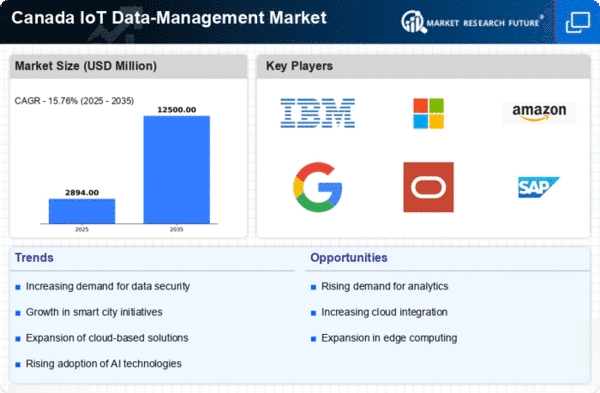Rising Investment in IoT Startups
Investment in IoT startups is a notable driver of the iot data-management market. Venture capital funding for Canadian IoT companies has seen a substantial increase, with investments reaching approximately $500 million in 2025. This influx of capital is fostering innovation and the development of advanced data management solutions tailored for IoT applications. As startups introduce novel technologies and approaches, the iot data-management market is likely to expand, offering businesses a wider array of options for managing their IoT data. This trend not only stimulates competition but also encourages established companies to enhance their offerings in response to emerging solutions.
Expansion of Smart Cities Initiatives
The development of smart cities in Canada is significantly influencing the iot data-management market. Municipalities are increasingly investing in IoT technologies to enhance urban living through improved infrastructure, transportation, and public services. This trend is expected to drive the market, with investments in smart city projects projected to exceed $1.5 billion by 2025. The integration of IoT devices generates vast amounts of data, necessitating robust data management solutions. Consequently, the iot data-management market is poised to benefit from the growing demand for systems that can efficiently handle and analyze this data, ensuring the successful implementation of smart city initiatives.
Rising Demand for Real-Time Analytics
The increasing need for real-time data analytics is a pivotal driver in the iot data-management market. Organizations across various sectors in Canada are recognizing the value of immediate insights derived from IoT data. This demand is projected to grow, with estimates suggesting that the market for real-time analytics could reach $2 billion by 2026. Companies are leveraging these insights to enhance operational efficiency and improve decision-making processes. As a result, The IoT data-management market is experiencing a surge in solutions. These solutions facilitate real-time data processing and analysis., enabling businesses to respond swiftly to market changes and consumer needs.
Growing Emphasis on Data Interoperability
Data interoperability is becoming a crucial factor in the iot data-management market. As organizations deploy diverse IoT devices and systems, the ability to share and utilize data across platforms is essential. In Canada, the push for standardized protocols and frameworks is gaining momentum, with industry stakeholders advocating for solutions that enhance compatibility among various IoT systems. This trend is likely to drive innovation in the iot data-management market, as companies seek to develop interoperable solutions that facilitate seamless data exchange. The potential for improved collaboration and efficiency across sectors could lead to a more integrated IoT ecosystem.
Increased Adoption of Cloud-Based Solutions
The shift towards cloud-based solutions is a significant driver for the iot data-management market. Canadian businesses are increasingly adopting cloud technologies to manage their IoT data due to the scalability, flexibility, and cost-effectiveness they offer. Reports indicate that the cloud services market in Canada is expected to grow at a CAGR of 15% through 2027. This transition allows organizations to store and process large volumes of data without the need for extensive on-premises infrastructure. As a result, the iot data-management market is witnessing a rise in demand for cloud-based data management platforms that can seamlessly integrate with IoT devices and applications.
















